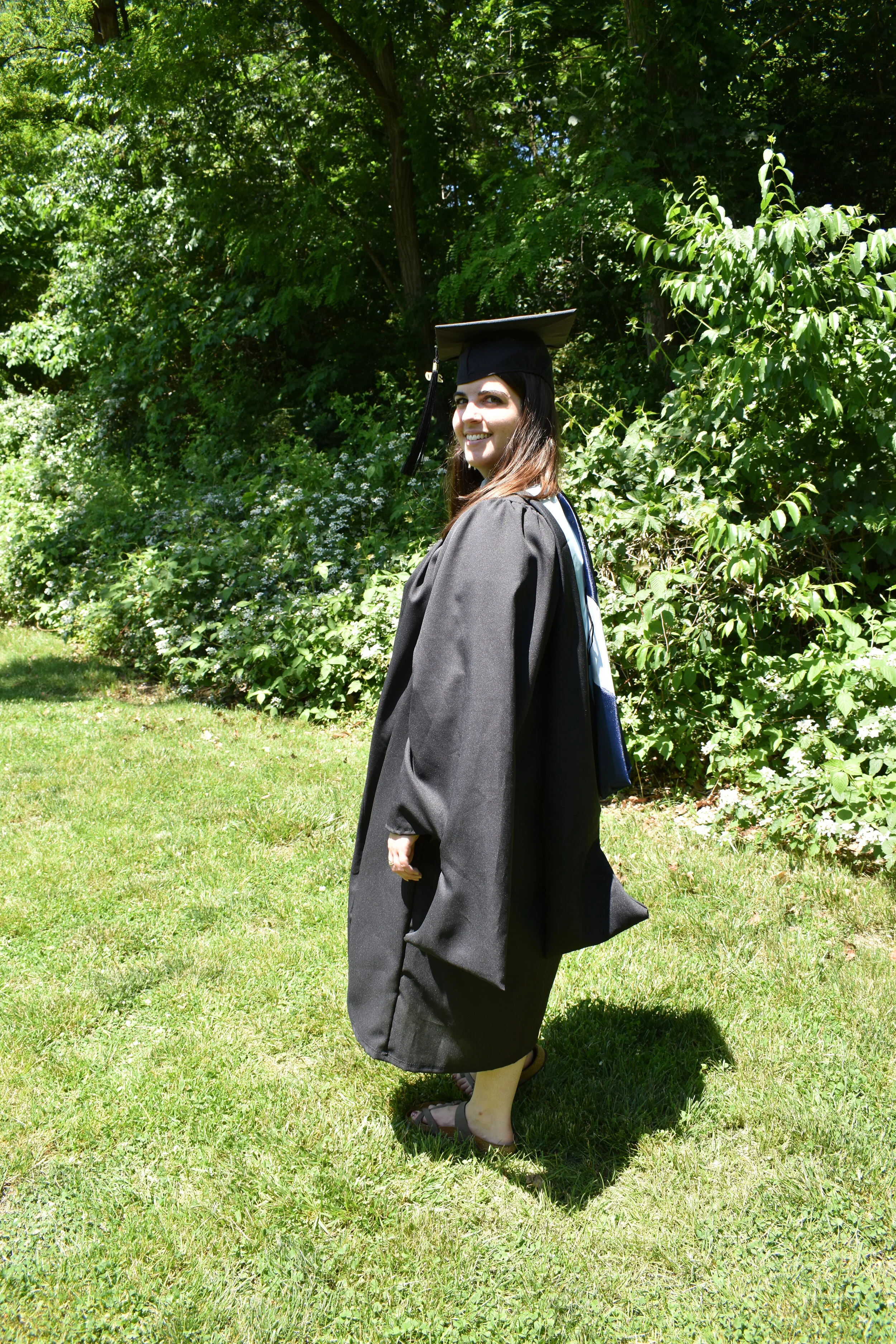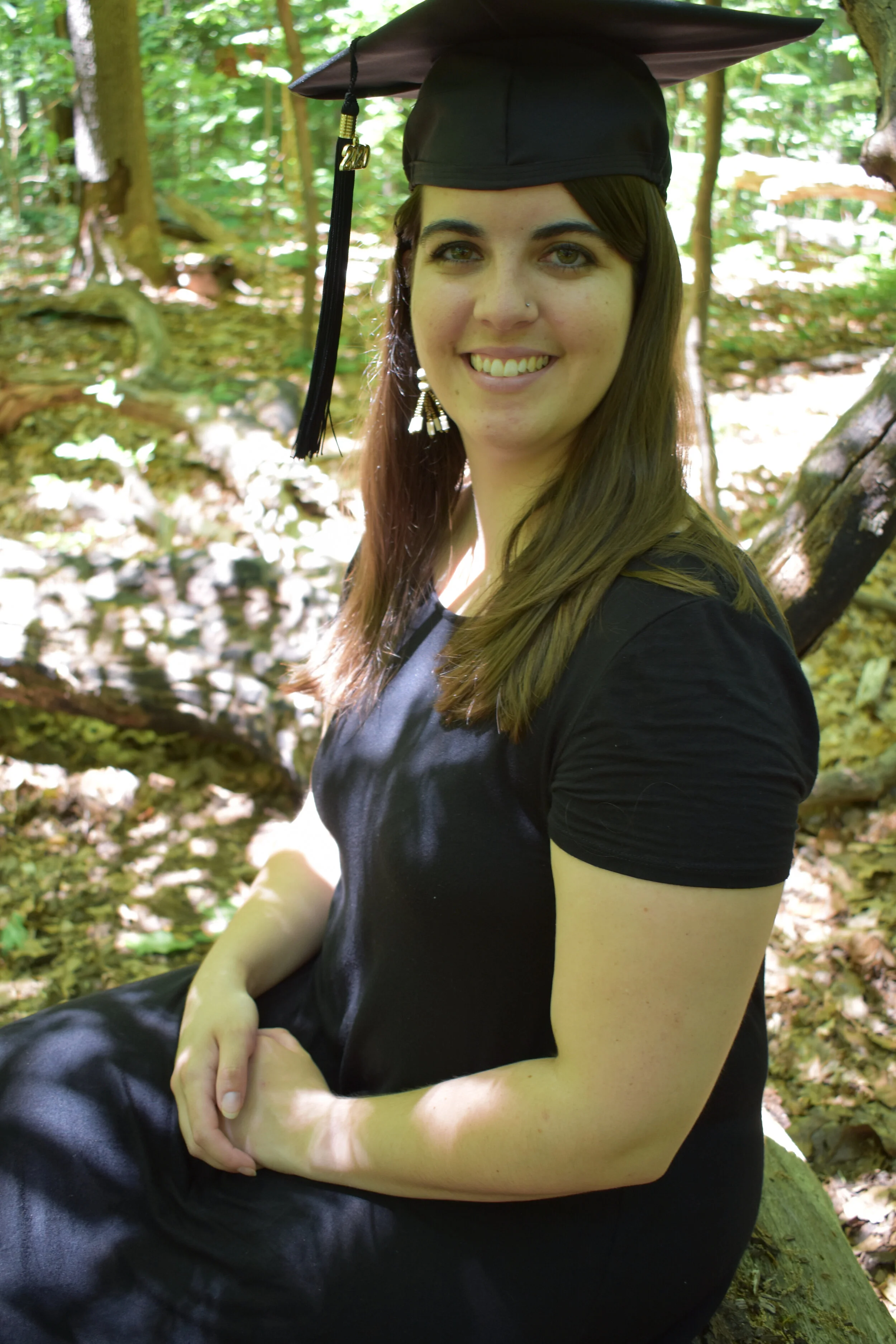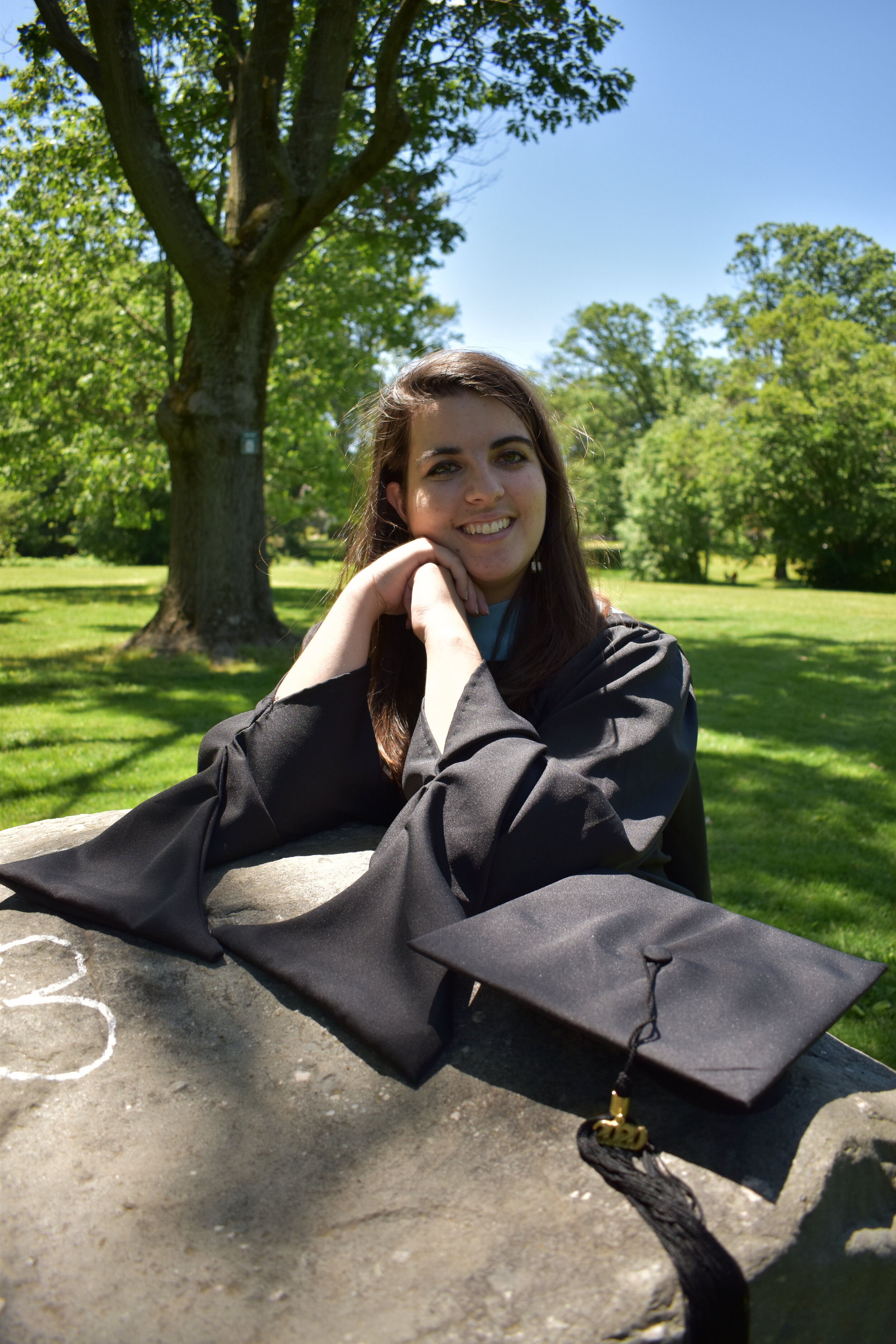A reflection on my master’s program
In early March, I was privileged to talk with prospective students considering Messiah’s Graduate Program in Higher Education. I adapted my speech to share with you!
Two years ago, I found myself at a recruitment weekend, but I had absolutely no idea why I was pursuing a degree in higher ed. In fact, I barely knew what the field was. I just really wanted a certain graduate assistantship, and I felt like God was calling me to consider this path, so I obeyed.
Over the last two years, I served as the GA for Off-Campus Programs. It’s been an absolute delight to help students have the best possible experience while abroad because of how impactful my own study abroad experience was. In fact, I would not be here today, studying and writing about higher ed, had I not studied abroad in 2014. Through that experience, I learned that there are loads of opportunities in the world, professors love to connect with students, and I am not confined to the little box I had once created for myself and my potential.
With that, I approached my time in Messiah’s master’s program with a reflective and evaluative mindset. Keep reading for some of the lessons I learned!
First and foremost, I am not Superwoman.
I cannot do it all, no matter how much I try to convince myself otherwise. I tend to say yes to pretty much any opportunity that comes my way. As a result, I keep my schedule very full and honestly wouldn’t want it any other way. The majority of my commitments bring me great joy and fulfillment. However, I’ve learned that I need to cut back and prioritize what is important. Everyone will tell you that their need is top priority, but for the most part, it’s up to you to recognize your capacity and add or remove things from your schedule accordingly. This has been a painful process for me since I place great value in my “yes.” But even simple attitude shifts, like saying “I GET to do this,” rather than “I HAVE to” makes a huge difference. I embrace my full schedule with joy. And, when necessary, I pull back and happen to find grace from those around me.
Every choice we make is an opportunity to learn.
Primarily, I discovered my limits. I don’t want to say that I learned from my mistakes because I believe that I intentionally made choices as I went through this program, and they are all learning opportunities. Sure, in the future, I won’t make those same choices, but I do not regret the lessons I learned as a result of those choices. Let’s take a look at some of those choices:
Last year, I had a moment of panic and applied for 150 internships and interviewed for 50 of them. I was afraid that I would not get an internship at all and as a result would not be able to graduate. Turns out, I didn’t need to worry.
In hindsight, I was able to recognize a habit I have of coping with stress by overworking. In the year since, I have worked more intentionally at determining triggers and responding more healthily.
This fall, as I applied to doctoral programs, I kept the number more reasonable and responded to stress by recognizing it, talking it through with people I trust, and reminding myself that God will work all things out in the long run, just like how He guided me to Messiah’s Higher Ed program.In my first year in the program, I took a year-long, 6-credit spiritual formation class at a seminary in addition to a full credit load here and working 3 jobs.
I was maxed out, yet I learned to identify warning signs that I am nearing burnout. The first sign is that I don’t want to be gracious to others when they disappoint me, usually because I lack the capacity to be gracious towards myself.
I also learned to incorporate self-care, since that was the best way to make sure I had the emotional capacity to survive grad school. I also learned that I probably shouldn’t do anything like this again, so when the opportunity arose to take a follow-up course this year, I declined for the sake of my own sanity.
I also discovered that I am much more capable than I previously believed.
When I started this program, I had been out of school for three years. I was a little nervous to jump back into school, and this was heightened by the fact that the program was primarily paper- and project-based. I came from the sciences, so I knew how to study for tests. I was not a confident writer.
Remember that spiritual formation class I just told you about? That was the BEST way for me to learn that I am a capable and competent writer. For that program, I wrote one paper per week, most of them ranging 6-10 pages. I balanced that with discussion posts and papers for my Messiah courses. I broke free from whatever mental constraints I had placed around my writing ability, and I completed assignments and projects with relative ease. I still have moments of self-doubt, but I remind myself that there’s no way I would have gotten here without genuine skill and effort.
I’ve also learned about grit and determination through exercise.
A few years ago, I heard a speaker share that great leaders first lead themselves well, often through exercise. While it can be challenging to incorporate physical activity into an already full grad student schedule, I have come to recognize its importance. During my first year, I exercised minimally because it seemed like an easy thing to cut from my schedule. This past year, I have been more intentional about carving out time for daily activity. I find that the reminder while exercising that I can push myself beyond preconceived limits applies nicely to my academic and professional career. I am convinced that because I see results from pushing myself while exercising, I am better able to push myself in academic pursuits. I have confidence that I can persevere through whatever God has called me to.
I discovered that I am the one who determines what I get out of an experience.
In this program, I wanted to network, meet people, and set myself up for the future. So from Day 1, I started having informational interviews with people all over campus. People who were like me and people who were not. People who held positions I could envision myself in, and people who led areas that were not particularly interesting to me. I learned about a variety of different career paths that led people to their current position of leadership. Along the way, I discovered the most incredible support system. No one wanted anything less than my success.
If I asked for extra opportunities, I typically found them.
While my GA position is primarily with study abroad programs, when I was finished with my work in that area, I turned to my colleagues in Multicultural and International Student Programs and assisted with their projects. As a result, I am certified as a Designated School Official, which allows me to work with international student records. Also, when I determined that I wanted to work in Academic Affairs long-term, I was able to gain more experience by joining the College Honors Program as an intern. Honors staff are grateful for my assistance, and I am grateful for the chance to work with more students and help develop the program.
Also, almost every course I took in the higher ed program concluded with a final project. I chose to complete these projects on issues happening at Messiah so that the projects might actually be useful. Most recently, in the strategic leadership class, I created a proposal for a GA position for the Honors Program. While they were not able to implement the position this year, I was able to take some of the responsibilities I proposed and use them to frame the work I did for the program. Also, some of the events I proposed will begin to happen next year, so I’m pretty excited to help plan those throughout the rest of the spring.
There is an abundance of opportunities on campus, all awaiting you to seek them out! People around campus want to see you succeed, and if they can mentor you through volunteering through their office, I encourage you to pursue the opportunities.
I’ve spent the last year and a half processing the idea of a “best yes.”
I can say yes to everything, but that leaves me spread very thin. Here are some of the yeses I said throughout my time in the program and why I would encourage you to say yes to these opportunities as well.
Professional development. This is a great chance to network and prepare for what you might do after graduation. It’s never too early to start taking steps in the direction you want to go.
What’s Up Doc? You get to chat with peers and faculty about current issues in higher ed in an informal context. Very informative!
Lunch of coffee with other GAs. These people are going through the same program as you and it’s so good to have friends you can rely on and support in return.
Volunteer projects. This is a great way to get to know undergrads, develop leadership, and serve.
I’m so glad I got to know my peers.
I have made some of my very best friends during my time in this program. Being a grad student can be isolating at times, so I encourage you to have coffee or lunch with others who are on campus. I’m really shy and introverted, but I’m not sure anyone in my cohort would guess that based on how intentional I am with developing friendships. These friends are the people who will help you get through this program. You’ll laugh together, vent together, and cheer on each other’s successes. You have an incredible opportunity to work on a college campus for two years. Make the most of it!
I found some pretty sweet grace in this journey.
I’ve been blessed with a great supervisor who has had immense grace as I try to find my footing in the world of higher education. Sometimes I’ve asserted myself too much. Sometimes I held frustrations in longer than I should have. My supervisor has opened her door to me several times so I can process the things I’m learning, the challenges I’m facing, and my dreams for the future. Along the way, I’ve learned to give myself grace too. I’m still new to higher ed. Like I mentioned earlier, I can always learn something from the choices I make.
I used to feel shame about my background.
I come from neuroscience, and for a few years, I could not figure out how that fits into higher ed. It wasn’t until this past fall that I started to see how beautifully my background ties into the future. My background in quantitative research sets me apart from many of my peers entering doctoral programs in higher ed. My passion for the brain and psychology led me to find a niche with research on student learning and engagement. Just last week, I was approached by a professor in one of my potential doctoral programs who was excited about my background in neuroscience because he’s been brainstorming a project for years and was waiting for the right opportunity or person to come along.
Also, I would be remiss if I did not mention my thesis.
For the last year or so, I have been exploring growth mindset, or the belief that intellectual ability is malleable and can be developed through quality mentoring, good learning strategies, and persistence in the face of challenges. Growth mindset is on a continuum, so while I might approach areas like fitness with a growth-minded perspective, I can still be very fixed-minded in other areas, especially when it comes to friendship or my writing ability.
Pretty much every time I read a research article about growth mindset, I feel little pangs of conviction about where I can still develop growth mindset. In fact, I think I’ve felt more imposter syndrome in relation to my thesis than anything else. However, I am continuing to learn and grow through this experience.
One of the most-repeated sentiments in the interviews I conducted is that when students hold a growth mindset, the learning process is more important than the grade achieved. While I still don’t like receiving less than an A, I think I’ve begun to adopt this mentality as well. Qualitative research is new to me, and I keep trying to turn my project into something quantitative, which is more comfortable. But by the end, I will be thankful for the learning experience of diving into a new methodology, even if my study doesn’t impact the field.
With that, I want to encourage you to consider your mindset as you enter this next season of your life. There is so much to learn in your journey with God. Seek out learning opportunities. Network. Meet new people. Make the most of it. Joining the Graduate Program in Higher Education at Messiah was one of the best decisions I ever made. I hope that you will say the same about the next step in faith you take!


